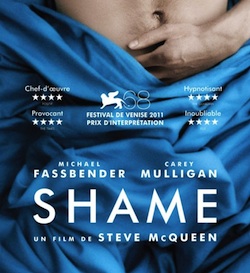 I just got home from finally seeing a movie called
I just got home from finally seeing a movie called Michael Fassbender’s Penis. Shame at the Landmark Cinema. Here are some of my thoughts on Shame Michael Fassbender’s penis.
1. When you go up to the ticket taker, don’t say “Hi, I’d like one ticket to see Michael Fassbender’s penis,” even though every fiber of your being is screaming at you to do so because well, let’s face it, that’s why you’re there. I made the mistake of saying this. (Actually, that’s just a joke. I said, “I’d like one to Shame.” But then I was taken aback when the ticket lady started wanting to talk to me about Murakami’s 1Q84, which I had in my hand.
2. I was surprised at how many straight couples who looked like they were on dates. Still, hallfway through the trailers, someone in the audience yelled, “Hurry up and show us the penis!” (This is not a joke.)
3. As soon as the film itself starting rolling, someone else yelled, “Show us the penis!” (This, too, was not a joke.)
4. What’s the big deal (pun intended) about Michael Fassbender’s penis in Shame? It’s not that big. He is a beautiful man (perhaps more so clothed than not), but I wouldn’t say his penis is his biggest or best attribute.
5. You barely see the damn thing. After all the hype on how it’s in your face again and again, I’m starting to wonder if the (male and female, gay and straight) people who told me about it so breathlessly are closet puritans.
A complete afterthought: the film itself was so-so for me. It is perfectly shot, reminding me in the manner of two films I’ve recently seen (The King’s Speech and All The President’s Men), which are simply so beautiful and perfectly photographed for the story they are telling, they could almost be watched silently. Shame portrays a fantasy of New York I am not completely unfamiliar with (the longing, the desire to connect with people even when they are emotionally distant, the singer who draws tears from her estranged brother), and yet the reality of the film (the business world, the wealthy apartments, the sex at the Standard Hotel) are completely foreign to me.
McQueen shoots certain scenes in one shot in a way that is so claustrophobic, by the time you realize he’s going to keep the whole scene in one shot, you’re clawing with claustrophobia to be released; and, for the most part, this works. Every time he did it, I felt so uncomfortable and so nervous that I thought it was brilliant drama. Still, even though I have been on dates like the one Fassbender (the man, not the penis) goes on in the middle of the film, and I think he portrayed the awkwardness of that kind of date to a “t” (especially with the role of the waiter), that scene felt like it was from a completely different movie.
There were moments where Shame felt near the edges of David Lynch, where he was creating a king of modern noir; he played at the way Lynch is able to make you feel like you’re living in a world of night, even when scenes are taking place during the day. This Lynchian realm was hinted at in the office scenes, and was exemplified for me, for some reason, in the fact that you never knew just what the hell any of these people do. McQueen damn near achieves this Lynchian noir world in the brilliant scene where Carey Mulligan sings “New York, New York” mostly in one long, painful close-up:
McQueen cuts away to show Fassbender crying, just using (I think) three shots in total to cover the scene. It’s still a near miss in achieving the kind of absurdly, terrifying and beautiful noir mood Lynch creates in Blue Velvet:
Or in two different scenes in Mullholland Drive:
But it’s close. But that’s the only time McQueen allows the dangers lurking at the edges that are threatening to erupt (incest, domestic violence, workplace warfare) to get really close to the fore, despite the type of graphic sexuality that would pass on Sex and the City.
I also found the scene of Fassbender running (while his sister is banging his boss in his bed) especially moving, for some reason. The tracking shot is so long you don’t think it will ever end, and McQueen does dare here (as he does a couple of other times) to allow his subject to disappear into total darkness. It’s touching, for some reason, to see him standing by the broken, dangling walk signal and humanizes a character that comes off as somewhat one-dimensional for most of the film.
I think it touched me, too, because it reminded me of when I’d run all over the city, any time of the day and night, and made me sad that I can barely move my feet to walk anymore.
